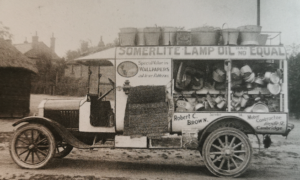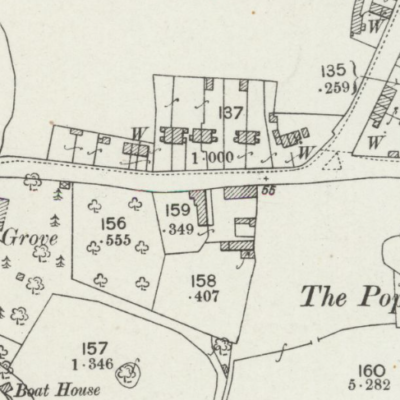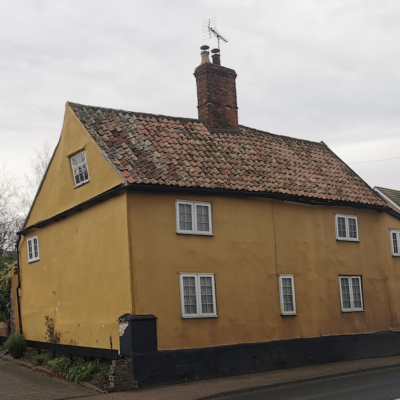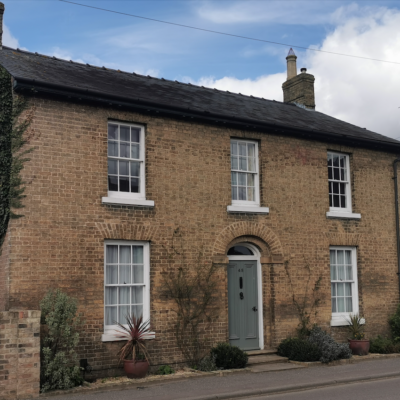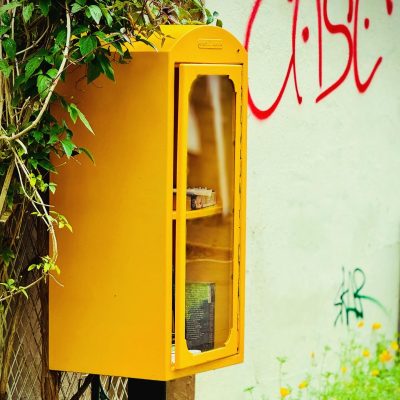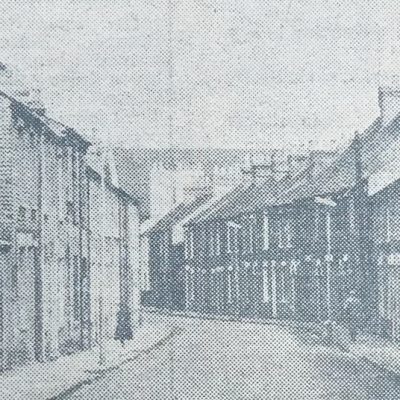Search by topic
- archaeology
- architecture
- bricklayer
- Building of Local Interest
- carpenter
- church
- crime
- dressmaker
- fire
- Great Eastern Railway
- listed building
- medieval
- oral history
- Public House
- Rattee & Kett
- Religious House
- Roman
- scholar
- school
- Then and Now
- tudor
- women
- work
- world war one
- world war two
Search by text
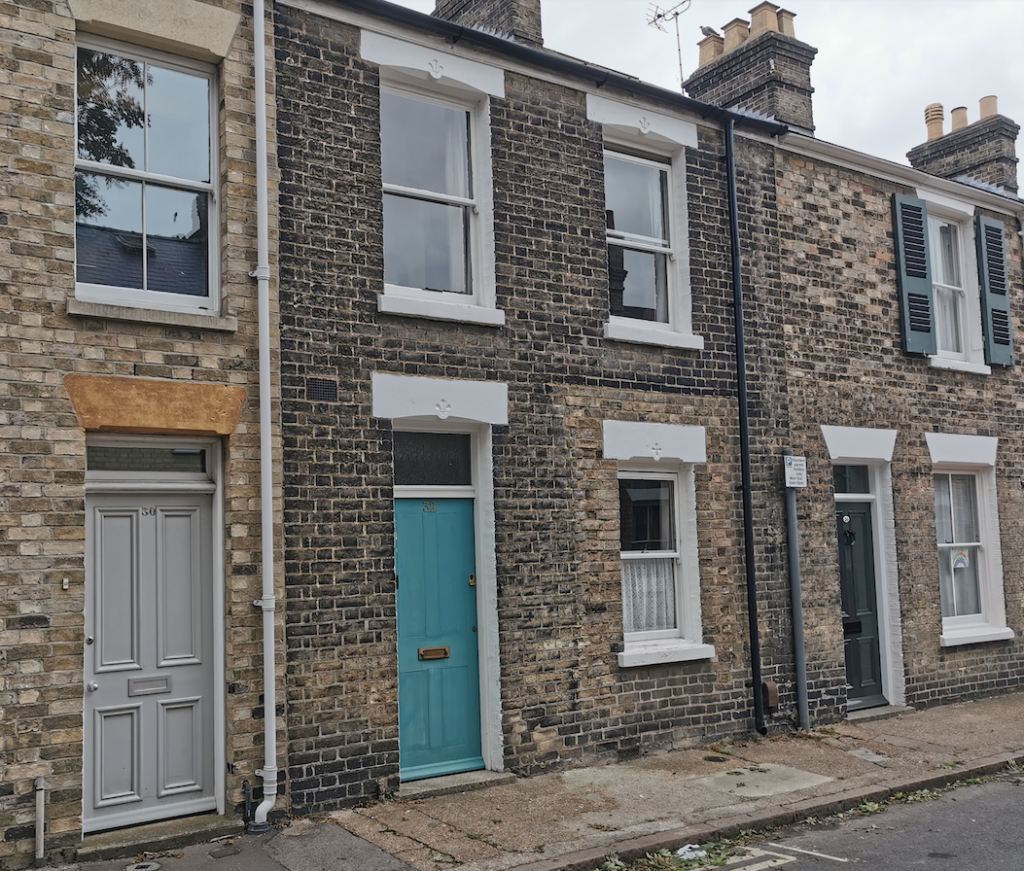 32 Gwydir Street
32 Gwydir Street32 / 30 Gwydir Street
History of 32 Gwydir Street
1881
Elijah Odell, head, 53, marine store dealer, b Beds
Mary, wife, 55, b Herts
Elijah, son, 13, son, father’s assistant, b Cambridge
Alfred Jacobs, 16, grandson, marine store dealer’s assistant, b Cambridge
1891
Elijah Odell, head, 65, dealer, b Cambridge
Mary, wife, 68, b Cambridge
Elijah, son, 22, greengrocer hawker, b Cambridge
G Whitmore, visitor, 22, waitress, b Bedford
1892 CIP 9.1. 1892 assault by Elijah Odell, hawker, on Joseph Redfarn
1901 30 & 32 Gwydir Street
Elijah Odell, 75, working from home as a rag and bone merchant, b Cambridge
Mary Odell, 76, b Cambridge
On the 5th September 1902 the Cambridge Daily News reported on how Cambridge celebrated the Coronation of King Edward VII. In particular they described the “Old People’s Tent”, which contained “a large number of people who were present at the Cambridge festivites on the occasion of the late Queen’s Coronation”. The article then went on to list the names, ages and addresses of the old people who were present. This list includes “Mrs Eliza Odell, 32 Gwydir Street (76)”. Someone has made a mistake with the name ‘Elijah’.
1911
Robert Brown, 28, oil and hardware merchant, b Cambridge
Nellie, 28, b Cambridge
Vera, 5, b Cambridge
Verita [sic], 2, b Cambridge
1913
Robert Brown, oil and hardware merchant
CIP 2.5.1913: Oil Van in Flames: Mr R C Brown was conveying oil to Balsham on the Summerlight oil van when it burst into flames. Everything was destroyed but the horse was saved. The van was new in 1912 and worth £75.
1914
Cambridge Independent Press 17/4/1914
OIL STORES ABLAZE. Disastrous Fire in Gwydir Street. EXCITING SCENES Great excitement was caused in Cambridge shortly alter five o’clock on Easter Monday evening by an outbreak of fire which occurred at the warehouse and yards Mr. Robert Charles Brown, oil and hardware merchant 32 Gwydir-streel. Damage estimated at some thousands of pounds was done by the fire, which destroyed five loaded vans and a pony trap, well as stock consisting paraffin and other oils, matches, and other stores. The premises were gutted.
Discovery of the Fire.
Mr Brown occupies the house at 32, Gwydir street, and his warehouse and store rooms, which were built for the most part of starred boarding adjoin the house, and are approached by an entrance into the warehouse at the side of the house. Into this warehouse the vans were drawn and loaded, and at the time were standing very together. Mr. Brown was in the living-room about five o’clock, and noticed smoke issuing from the back end of the warehouse. He at once went to the door, and found that the place was full of smoke, and the van at the end nearest the street was in flames. The under part was well alight, and the flames appeared to be climbing up to the top. Realising the seriousness of the situation he promptly called to Mrs. Baker, who lives at 28, Gwydir-street, to give the alarm to the fire brigade, and this she did at the call-post in Norfolk street. Word was sent down to Mr Charles Brown at 64. Gwydir-street, father to Mr. Robert Brown, and he was soon on the spot with a number of men.
Meanwhile the fire had made considerable headway, for, being in a difficult position, little effect was made with a few buckets water. Mr. Brown, sen., at once directed attention to the five horses stabled at the back of the premises. As there was but one entrance to the warehouse it was impossible to rescue them by that owing to the fire. He went through the neighbouring house, and, assisted by Mr. Arthur Denstone of 44 Gwydir-street and a number of other willing helpers, they set to work pulling down the fence. With some difficulty they got the horses out by the back way, and placed them in Mr. Cock’s stables in Sturton-street. A dog which was chained to a kennel near the vans was also released with a struggle.
Fire Brigade’s Call.
During this time the fire had been gaining ground, the flames spreading from one to another. The call was received at the fire station at 5.10. and in exactly one minute the motor fire escape, in charge of Foreman Brookman, Engineer Pearl and Fireman Papworth, left the station, being on the seen of the fire within five minutes of receiving the call – a very smart performance. They soon had hydrants playing on the burning vans but for some time made little impression. When the street doors of the warehouse were opened the draught caused the flames to spread the length of the warehouse, with the result that all five vans were soon blazing. A call was made for the fire engine, and received at 5.32. It left at 5.35 with Engineer Pearl and Fireman Carter and Amps aboard. P.C. Clark, of the Borough Force, was first on the and spot, and he was speedily joined by other members. Capt. Greel [?] arrived shortly afterwards, and took charge of operations, being joined by Lieut. Sanderson, with Firemen Parsley, King and Hewitt, and a good number of voluntary members of the brigade.
A number of policemen were at once drafted to Gwydir-street to control the crowd of spectators, numbering several thousands, that assembled outside the house and at all points of vantage from which to get a view of the scene. Superintendent Hargreaves (Deputy Chief Constable) was in attendance, with Acting-Sergt. Winter. Sergt. I . Savidge, Det.-Sergt Marsh, Acting Inspector Free, P.C. Rowlinson and a number of other constables.
Oil Cans Ablaze. Attention was first paid by the brigade to the premises adjoining the warehouse for with such combustible material little could be done by playing on to it with the hose. A shed closely packed with crockery stock was partially knocked down to clear the ground, but the flames swept down the vans and also caught the goods stored on the shelves in the warehouse. These included several hundred gallon cans of paraffin, and with a few exceptions these were destroyed. The cans exploded, and a volume of flames several feet shot up again and again to the roof, which soon burned furiously.
Some the stock that could reached was thrown into the street. This included about a half-cartload of matches packed in dozens, also doormats, oilcans, etc., the street presenting a curious sight. The van nearest the street was completely burned, and the framework was removed into the street. The second van was also taken out to enable those at the back to be attacked.
Removing the Furniture. Mr. Brown’s house was cleared of furniture, and shortly afterwards the house occupied by Mrs Baker, at no 28, and one on the other side [34] occupied Mr. A. Beales, were emptied of nearly every article of furniture. The clearances were effected with the aid of a small army of willing helpers within a quarter of an hour of the commencement. At No. 34 the windows were broken, and the sashes were torn from the frames in the haste. Articles of all descriptions were handed down into street, and removed to places of safety, but considerable damage was done in transit, for it was observed that breakable articles were thrown into the garden, only to be trampled on. However, the fire was confined to the premises upon which it started, and later what remained the furniture was taken back.
The flames swept down the sides of the sheds at the back of the warehouse, and the sides were broken down to reach the fire. The stables at the end were saved, but the last van was practically destroyed, although some of the oil was removed from inside. After about hour and quarter the flames were narrowed down to one vehicle, which was loaded with cans of paraffin, and this gave a deal of trouble. The fire was finally extinguished, after several ineffectual attempts, soon after 6.30.
Just before that time it was noticed that the roof of Mr Brown’s house at the back was smoking. Water was played on it for some considerable time, both inside and out. The bedroom was flooded with water to a depth of several inches, and holes were punched in the ceilings to allow the water to run off. The roof was saved only at the expense of much damage by water.
By 6.15 the flames were completely subdued, but the place was a sorry spectacle. Many articles were floating in water, and crates of goods were overturned and saturated. Although the fire escape left just before eight o’clock a number of firemen were on duty until a late hour.
Cause of the Fire Unknown. The cause of the fire is a mystery. Seen after fire Mr. Brown could give no explanation. He said that men were at work in the earlier part of the morning loading the vans for Tuesday. They left about 11 o’clock when everything seemed all right.
It is difficult to estimate the damage done by the fire but it is expected to run into some thousands of pounds. Of the five vans one was new only a fortnight ago—two others had been bought during the last twelve months. Fortunately property which belongs Mr. Brown is insured, and also the stock. but a great deal of inconvenience and worry is necessarily entailed.
Great credit is due to the Cambridgeshire Brigade for the way in which they handled the fire. Situated as it was with houses on all sides, had it broken beyond its bounds much more damage would have done. The members of the police force did yeomen service, and facilitated matters for the brigade. A large number of men rendered valuable assistance in making clearances at critical times.
1939 (30-32)
John F J Holliday, b 1888, labourer
Mary, b 1906
?
Kathleen, b 1928
?
?
John R Holliday, b 1906, labourer
Elsie Cobb, b 1917, housekeeper
?
1962
Albert Stepney
Contribute
Do you have any information about the people or places in this article? If so, then please let us know using the Contact page or by emailing capturingcambridge@
License
This work is licensed under CC BY-NC-SA 4.0








